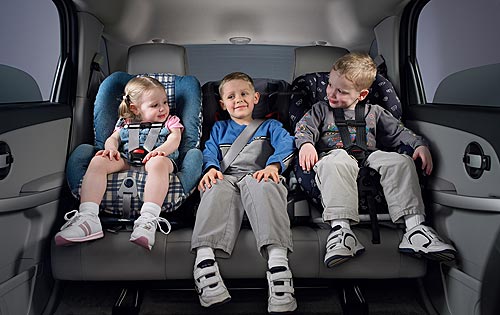Kids love to be the center of attention, and they often accomplish that by being rambunctious, loud, and silly. Even though most of the time they’re being told to behave, it’s still attention. That kind of behavior isn’t always dangerous at home, but it can be inside of a vehicle. When you’re driving, you can’t intervene in an unsafe situation like you could at home.
Many drivers are also easily distracted by kids fighting or being silly, which sometimes leads to an accident. Accidents aren’t always the result of bad driving or unsafe vehicles. Even the most family-friendly subcompact SUVs can’t protect you from distractions.
Here’s how you can make sure everyone in your vehicle arrives safely at your destination:
1. Give your full attention to the road no matter what
Remember when you started learning how to drive and you weren’t sure you could reach over to turn the heater on and stay in your lane? That’s the level of attention you need to put on the road when transporting your kids. If your kids need to be tended to beyond spoken words, pull off the road and park before addressing the issue.
It doesn’t take more than a moment for an accident to occur. Maybe you’ve spent years turning around to tell your kids to behave without incident. The one time a pedestrian walks in front of your car, or an exhausted big rig driver crosses into your lane, you’ll regret it.
Truck accidents are responsible for 4,300 fatalities each year, and it’s not usually the passenger vehicle driver’s fault. Most of the time, truck drivers are under pressure from their boss to ignore laws. They’re overworked, exhausted, and on tight schedules they can’t meet unless they break the rules. When your eyes aren’t on the road, you can’t react to a truck creeping into your lane. When your attention is on the road, you’ll be more likely to spot a drifting truck in time to avoid an accident.
2. Don’t let your kids play with toys you confiscate at home
If you’ve had to confiscate certain toys from your kids in the house, don’t allow them into the car. The toys don’t need to be sharp and pointy to pose a danger. Anything that’s known to be a reason for your kids to fight, argue, complain, or act out should be left at home or packed into a bag they can’t reach.
3. Establish rules for car rides with consequences
It sounds silly, but if your kids are rambunctious, you may benefit from setting ground rules for car rides. For example, no screaming or kicking, if they want a window rolled down they need to ask the driver, don’t unbuckle anyone else’s seatbelt or car seat, and don’t throw anything into the front seat or at the driver’s head.
Remember to let them learn by experience. When rules are new, kids don’t always break them on purpose. They need time to adjust to modifying their behavior. On the first violation, ask them if they know what rule they violated. Give them a chance to think about it. When they recognize what they’ve done, let them know that’s the rule you asked them not to break, and explain the rule is for everyone’s safety.
If you want your kids to form a habit of thinking about the consequences of their actions, you’ve got to allow them to make the mistake and figure it out for themselves. On the second violation, they may have made an honest mistake, but they’ll know right away how they slipped up.
4. Always check the back seat when you exit your vehicle
Each year, about 40 kids under the age of 6 die after being left alone in a car. Most of them suffocate. The cause isn’t usually sinister. Some parents don’t realize how hot the inside of a car can get, and others forget their kids are in the car because they’ve changed their routine. It may have been okay to leave your kids in the car twenty years ago, but today it’s unacceptable. As this mom found out, bystanders pay attention and will contact police, even if you crack the windows on a chilly day and are gone for five minutes.
Develop a habit of checking the back seat before you exit your car. All it takes is a quick glance. You might think you’d never be one of those parents, but that’s what everyone says when it happens to them.
